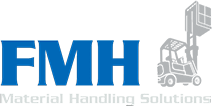Forklift Winter Maintenance
The winter weather can bring unique challenges to your warehouse and forklift equipment. A forklift’s electrical system and engine can be heavily affected by cold, wet weather and the stress of overuse during the holidays. Just like making changes for your warehouse and employees, preparations and changes are necessary for your equipment and forklifts.
Here are the best practices to optimize your forklifts and keep your operators safe.
1. Pre-Winter Tune-Up
Cold weather can intensify problems such as hard starts, sluggish performance, or rough idling. Getting your fleet tuned-up prior to the cold weather will help your forklift withstand the cold temperatures and snow.
The money you’ll spend to get your forklift checked before winter is worth more than the cost of repairs needed from cracked engine blocks, oil coagulation, and broken hydraulic pump shafts.
2. Have a Planned Maintenance (PM) plan with FMH
Even with a tune-up on your forklift, regular maintenance is required to ensure your forklift is properly maintained to keep it running throughout the winter. Like any equipment, it is vital to change the oil regularly and check the key components. A thorough maintenance routine begins with FMH Service’s planned maintenance program to provide regular maintenance all year long.
3. Perform Vigorous Pre-Shift Inspections
Forklifts should be carefully inspected at the start of each shift by the operator, as outlined by OSHA. This is even more necessary when cold weather hits. Hoses, fluids, and damage should be checked, reported, and fixed.
4. Change and Monitor Forklift Fluids
Forklift oil and hydraulic fluid should be swapped for winterized versions right for your climate to withstand the drop in temperatures.
Operators should be reminded to monitor fluids during the pre-shift inspection to ensure they’re in good condition. Diesel is highly vulnerable in cold weather, becoming jellylike in extreme cold, which can cause expensive and sometimes irreversible damage.
5. Inspect Forklift Tires Daily
Forklift tires can take a beating outside, especially when operating in the snow and ice. If the tire tread is getting low, it may be time for them to be replaced. If snow and ice are consistent, special tires with extra grip should be considered.
6. Check All Forklift Lights
With days ending earlier and weather conditions compromising visibility, it is important to ensure your lights are working correctly. If you’re using halogen lights, you may consider an upgrade to LED bulbs that shine brighter, last longer, and are not affected by freezing temperatures.
7. Keep Batteries Charged
Extreme cold or drastic temperature changes can decrease the running time of an electric forklift’s battery. To keep your warehouse running, it is essential to account for extra battery changing or charging. Regular battery and charger maintenance should also be performed to ensure you don’t run into problems with your equipment.
8. Perform Proper Cleaning and Storage
After every shift, forklifts should be cleaned of any snow, salt, dirt, or debris to prevent build-up that could interfere with operation. When not in use, the forklift should be stored in a warm, dry place to avoid ice formation, rusting, or other damage from exposure to the elements.
Contact the FMH Material Handling Solutions team to help you prepare for winter!
Forklift Safety Accessories: There are new innovative safety lights and alarms that make others aware of forklifts to keep them at a safe distance. Contact our Parts Department for these items
PM Inspection Service: Our Planned Maintenance service includes essential safety checks. Contact a FMH Representative for pricing.
Operator Training: Reach out to an FMH Representative for schedule and pricing to ensure your operators are trained.
Forklift Batteries & Chargers: FMH recommends Rocky Mountain Battery as the expert on forklift batteries and chargers. Contact them today!
